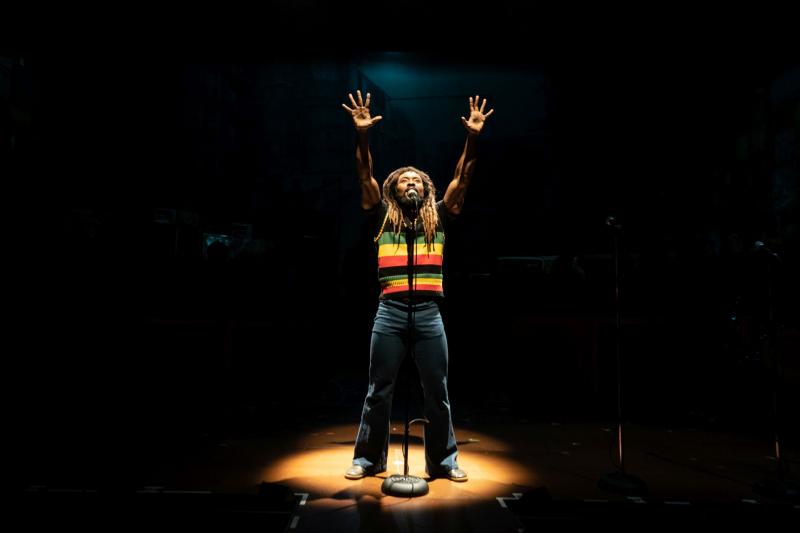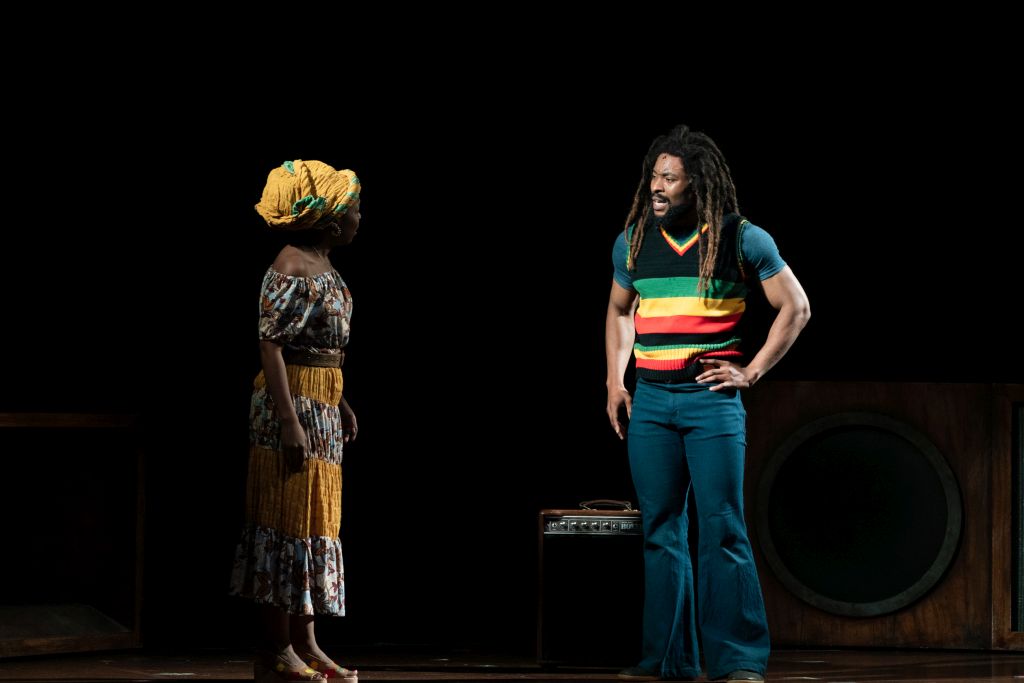Get Up, Stand Up!, Lyric Theatre review - knockout performance, undercooked book | reviews, news & interviews
Get Up, Stand Up!, Lyric Theatre review - knockout performance, undercooked book
Get Up, Stand Up!, Lyric Theatre review - knockout performance, undercooked book
Arinzé Kene astonishes as Bob Marley in wobbly biomusical

Can we turn off the script and simply leave the music to do its soul-stirring bit? That's likely to be a not uncommon response to Get Up Stand Up!, which gives Bob Marley much the same biomusical treatment currently on view in Tina across town (and in New York).
All the more reason to be reminded of both the music, and the message, of the Jamaican legend whose work comes with an inbuilt call and response, as was movingly evident on press night even without the visual reminders of Grenfell, Black Lives Matter, and other contemporary reference points to amplify the ongoing relevance of an artist here heard exhorting playgoers from the stage not to "give up the fight". Marley's "Redemption Song" late in act two stirs the house on the show's path from celebration to societal cri de coeur. And by the time the title song is delivered as an encore, the audience as one might expect is already standing up.
 What of the man himself? My advice on this occasion is to steep yourself in whatever background material you wish (the programme is a good place to start), and let the music do the rest. At the same time, be assured that no amount of advance prep can equal the modern-day force of nature that is Arinzé Kene. Not so much playing Bob as summoning his very being, this protean talent looks to be every bit as invaluable to the launch of this show as Adrienne Warren was to Tina.
What of the man himself? My advice on this occasion is to steep yourself in whatever background material you wish (the programme is a good place to start), and let the music do the rest. At the same time, be assured that no amount of advance prep can equal the modern-day force of nature that is Arinzé Kene. Not so much playing Bob as summoning his very being, this protean talent looks to be every bit as invaluable to the launch of this show as Adrienne Warren was to Tina.
A fine writer as an ancillary career, Kene might have been a shrewd choice to pen this musical. Instead, that assignment has fallen to Tony winner Lee Hall (interestingly, a scribe with the same surname as the author of Tina, Katori Hall). To call his contribution rudimentary is to downplay the dismay I felt at the interval at a show that had reached this state, a change of directors included (Clint Dyer replacing Dominic Cooke), with so little textual scrutiny. Things improve a lot after the interval, largely due as you might expect to the music: we finally get at least some sense of Marley as messianic figure, errant partner, and often-absent father, along with the medical diagnosis of a cancerous toe that led to his untimely death.
But though the structure aims to be looselimbed, it more often than not simply seems chaotic, playgoers urged at the start to shout out a Jamaican phrase or two before we follow the Tina model of rewinding to the early days, which here means the 1950s and the young Bob's thirst for "inspiration". Due obeisance is paid to his adoption of Rastafarianism and various industry hurdles and hurrahs, with the formation of the Wailers and its renaming, so as to put Bob front and centre, in 1974.
We follow his adulterous relationship with the onetime Miss World, Cindy Breakspeare (Shanay Holmes), with whom he had a son, and witness the toll that his libidinous ways take on wife, Rita. That part is given galvanic force by Gabrielle Brooks (pictured above), whose "No Woman No Cry" comes hurtling across the footlights: a necessary adrenalin rush after various longueurs.
Musical director Sean Green's band gets a deserved bow at the end and finds a propulsive momentum that may well make this show particularly appealing on disc, shorn of the haphazard storytelling. But Chloe Lamford's usual visual ingenuity is sacrificed here on the dreary altar of a set piled high with speakers and muddily lit by Charles Balfour in an attempt at atmosphere that merely clouds the glory of the lead performer on view. "The music lives eternally," Bob is seen telling his little son, a pro forma observation that is borne out by that rare star who brings with him a force field of charisma and command that, thank heavens given the circumstances, exists well beyond words.
rating
Explore topics
Share this article
The future of Arts Journalism
You can stop theartsdesk.com closing!
We urgently need financing to survive. Our fundraising drive has thus far raised £49,000 but we need to reach £100,000 or we will be forced to close. Please contribute here: https://gofund.me/c3f6033d
And if you can forward this information to anyone who might assist, we’d be grateful.

Subscribe to theartsdesk.com
Thank you for continuing to read our work on theartsdesk.com. For unlimited access to every article in its entirety, including our archive of more than 15,000 pieces, we're asking for £5 per month or £40 per year. We feel it's a very good deal, and hope you do too.
To take a subscription now simply click here.
And if you're looking for that extra gift for a friend or family member, why not treat them to a theartsdesk.com gift subscription?
more
 'We are bowled over!' Thank you for your messages of love and support
Much-appreciated words of commendation from readers and the cultural community
'We are bowled over!' Thank you for your messages of love and support
Much-appreciated words of commendation from readers and the cultural community
 iD-Reloaded, Cirque Éloize, Marlowe Theatre, Canterbury review - attitude, energy and invention
A riotous blend of urban dance music, hip hop and contemporary circus
iD-Reloaded, Cirque Éloize, Marlowe Theatre, Canterbury review - attitude, energy and invention
A riotous blend of urban dance music, hip hop and contemporary circus
 Album: Solar Eyes - Live Freaky! Die Freaky!
Psychedelic indie dance music with a twinkle in its eye
Album: Solar Eyes - Live Freaky! Die Freaky!
Psychedelic indie dance music with a twinkle in its eye
 Bacchae, National Theatre review - cheeky, uneven version of Euripides' tragedy
Indhu Rubasingham's tenure gets off to a bold, comic start
Bacchae, National Theatre review - cheeky, uneven version of Euripides' tragedy
Indhu Rubasingham's tenure gets off to a bold, comic start
 Slow Horses, Series 5, Apple TV+ review - terror, trauma and impeccable comic timing
Jackson Lamb's band of MI5 misfits continues to fascinate and amuse
Slow Horses, Series 5, Apple TV+ review - terror, trauma and impeccable comic timing
Jackson Lamb's band of MI5 misfits continues to fascinate and amuse
 The Harder They Come, Stratford East review - still packs a punch, half a century on
Natey Jones and Madeline Charlemagne lead a perfectly realised adaptation of the seminal movie
The Harder They Come, Stratford East review - still packs a punch, half a century on
Natey Jones and Madeline Charlemagne lead a perfectly realised adaptation of the seminal movie
 Kohout, Spence, Braun, Manchester Camerata, Huth, RNCM, Manchester review - joy, insight, imagination and unanimity
Celebration of the past with stars of the future at the Royal Northern College
Kohout, Spence, Braun, Manchester Camerata, Huth, RNCM, Manchester review - joy, insight, imagination and unanimity
Celebration of the past with stars of the future at the Royal Northern College
 Album: Night Tapes - portals//polarities
Estonian-voiced, London-based electro-popsters debut album marks them as one to watch for
Album: Night Tapes - portals//polarities
Estonian-voiced, London-based electro-popsters debut album marks them as one to watch for
 Coldwater, ITV1 review - horror and black comedy in the Highlands
Superb cast lights up David Ireland's cunning thriller
Coldwater, ITV1 review - horror and black comedy in the Highlands
Superb cast lights up David Ireland's cunning thriller
 Kerry Godliman, G-Live review - she's livid but delivers the laughs
Perimenopause provides rich seam of gags
Kerry Godliman, G-Live review - she's livid but delivers the laughs
Perimenopause provides rich seam of gags
 Mark Hussey: Mrs Dalloway - Biography of a Novel review - echoes across crises
On the centenary of the work's publication an insightful book shows its prescience
Mark Hussey: Mrs Dalloway - Biography of a Novel review - echoes across crises
On the centenary of the work's publication an insightful book shows its prescience
 Jansen, LSO, Pappano, Barbican review - profound and bracing emotional workouts
Great soloist, conductor and orchestra take Britten and Shostakovich to the edge
Jansen, LSO, Pappano, Barbican review - profound and bracing emotional workouts
Great soloist, conductor and orchestra take Britten and Shostakovich to the edge

Add comment